Entity Relationship (ER) Diagram is a visual representation of entities (people, objects, or concepts) and their relationships in a database, used to design and model database structures.
ER Diagram simplifies database design by clearly illustrating data entities, relationships, and constraints, helping to improve system understanding and ensure accurate database structure. They are widely used in software engineering, business information systems, education, and research.
Geekflare has researched and compiled a list of the best ER Diagram tools based on ease of use, built-in libraries, database compatibility, collaboration features, import/export options, and pricing.
- 1. Lucidchart – Best for Real-time Collaboration
- 2. Creately – Best for Intuitive Drawing and Diagramming
- 3. SmartDraw – Best for Automated Diagramming
- 4. Canva – Best for Visually Appealing Diagram Design
- 5. Visual Paradigm – Best for Comprehensive Online Modeling
- 6. FigJam – Best for Interactive Design and Prototyping
- 7. EdrawMax – Best for Template Variety
- 8. Miro – Best for Whiteboard-Style Collaborative Design
- 9. Dbdiagram.io – Best for Code-Based ER Diagram Creation
- Show less
You can trust Geekflare
Imagine the satisfaction of finding just what you needed. We understand that feeling, too, so we go to great lengths to evaluate freemium, subscribe to the premium plan if required, have a cup of coffee, and test the products to provide unbiased reviews! While we may earn affiliate commissions, our primary focus remains steadfast: delivering unbiased editorial insights, and in-depth reviews. See how we test.
Lucidchart
Best for Real-time Collaboration
Lucidchart is a powerful diagramming tool that helps users create dynamic visuals with AI-powered data connectivity and automation. It enhances teamwork by effectively visualizing systems, processes, and workflows.
Lucidchart’s ER Diagram tool simplifies the creation of Entity Relationship diagrams, making it easy to visualize database structures. Users can quickly design diagrams with drag-and-drop functionality and import existing data. With dedicated templates and standard ERD symbols, it efficiently illustrates relationships between entities.
Lucidchart provides customizable templates to enhance clarity and streamline communication within organizations. It offers easy integration capabilities to enable collaboration alongside used tools such as Jira, Confluence, and Slack, enhancing workflow efficiency. It Improves understanding and helps in database design and troubleshooting, making it invaluable for developers and data professionals.
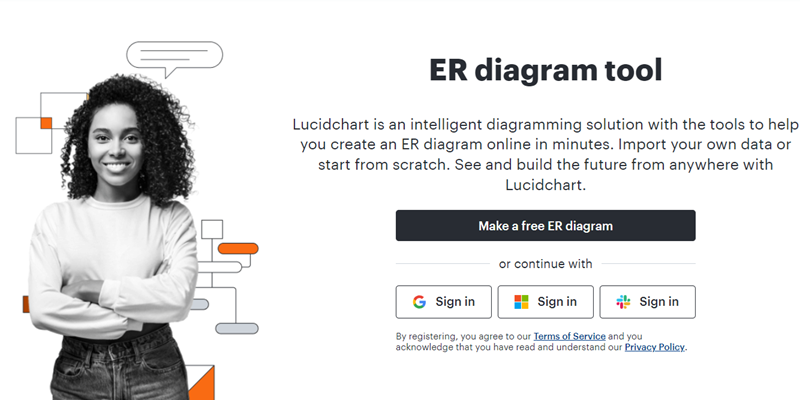
Lucidchart Features
- Generate visuals automatically with AI and data imports, or build your own using intuitive diagramming tools.
- With over 1,000 templates available, users can quickly find inspiration and solutions for various diagramming needs.
- Easily add shapes, symbols, and text with a user-friendly interface that simplifies the diagramming process.
- Easily export diagrams to various formats, including PDFs and images, for sharing and presentation purposes.
Extensive customization options and a wide range of built-in features for creating diagrams.
Integrates with Google Suite, Jira, Slack, Microsoft Office, and various DBMS platforms
Offers real-time collaboration features, allowing multiple users to work on the same diagram simultaneously
The AI feature is helpful but has not significantly reduced the time needed to create charts.
Experiences occasional performance slowdowns with larger or more complex diagrams.
Lucidchart Pricing
| Plans | Monthly Pricing | Offering |
|---|---|---|
| Free | Free | 100 templates, Basic Visual Activities, Data visualization integrations |
| Individual | $9 | Unlimited documents and objects, 1 GB storage, Visio import/export, premium visual activities |
| Team | $10/user | Advanced controls, revision history, SAML authentication, Password protected publishing |
Creately
Best for Intuitive Drawing and Diagramming
Creately is a visual collaboration platform that enhances teamwork and boosts productivity. It provides an infinite canvas for brainstorming, diagramming, planning, and real-time project management.
Creately’s ER Diagram Tool simplifies database design with its intuitive drag-and-drop interface. Users can quickly create detailed ER diagrams using ready-made templates and professional shape libraries. Support for various notations and the ability to embed diagrams in other platforms makes it easy to create, share, and manage ER diagrams effectively.
Trusted by over 10 million users worldwide, Creately offers intuitive design tools and seamless collaboration features, enabling teams to create visuals easily. Its extensive library of templates and shapes makes it easy to get started, while advanced sharing permissions ensure secure collaboration.
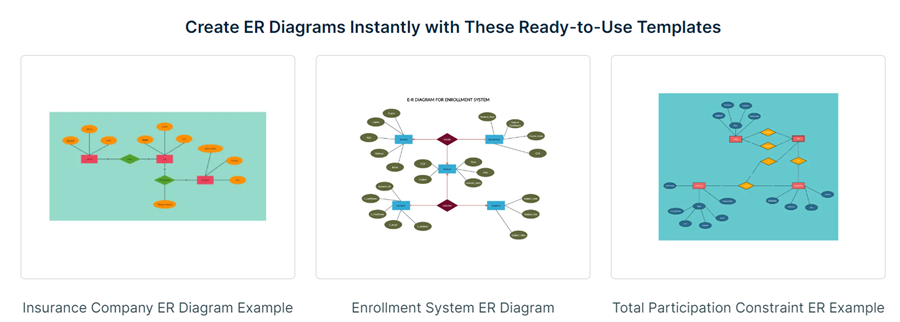
Creately Features
- Collaborate simultaneously on the same canvas with real-time cursors and updates, enhancing teamwork and communication.
- Create diagrams and models easily with a user-friendly design, requiring no extensive training, ensuring accessibility for all team members.
- Find specific elements quickly using universal text search, simplifying navigation within complex diagrams.
- Supports ER Diagrams, Database Diagrams, Data Flow Diagrams (DFDs), and UML models. Intuitive Interface.
Supports 70 types of diagrams with over 1,000 shapes and connectors.
Offer 8000+ templates to get started with ER diagrams quickly.
Integrate with various project management tools like Jira, Confluence, and Slack.
Slow performance or lag when working with very large diagrams or complex projects.
Glitches with real-time collaboration features can disrupt workflow.
Creately Pricing
| Plans | Monthly Pricing | Offering |
|---|---|---|
| Free Plan | $0 | Basic features with limited templates and diagrams, Real-time collaboration |
| Personal | $5 | Premium shape libraries premium templates, AI diagrams, Advanced collaboration, Unlimited canvases |
| Team | $5/user | Account management portal, Unlimited imports, 30-day version history, Email / Chat Support |
SmartDraw
Best for Automated Diagramming
SmartDraw is a versatile visual collaboration tool that combines diagramming, whiteboarding, and data visualization, making it ideal for teams across various industries. Its ER Diagram Tool allows users to create ER diagrams manually or automatically by importing data from CSV files.
With intuitive symbols and user-friendly features, SmartDraw enables users to visualize database structures without needing prior drawing experience.
The SmartDraw’s ER Diagram tool supports various notations and integrates smoothly with popular applications like Microsoft Office and Google Workspace. This makes it a valuable resource for software developers and database architects, facilitating efficient communication and documentation of data relationships.
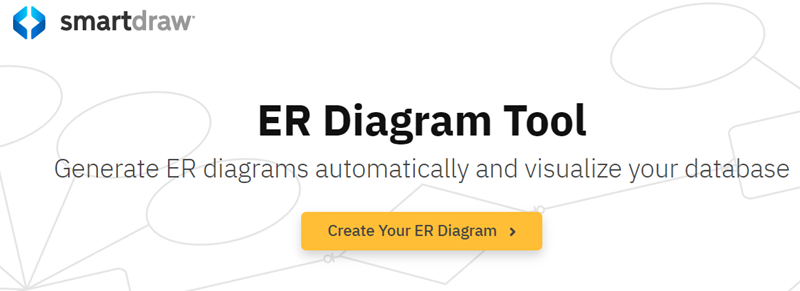
SmartDraw Features
- Users can easily generate ER diagrams from CSV files of table definitions, improving database modeling efficiency.
- Create diverse visuals, including flowcharts and organizational charts, using intuitive tools and templates.
- Integrates smoothly with Microsoft Office, Google Workspace, and various file storage solutions (e.g., SharePoint, Google Drive).
Automatically generate ER diagrams from existing databases, saving time and reducing errors.
Offers diagramming tools, including flowcharts, org charts, and ER diagrams, all in one platform.
Integrate smoothly with popular apps like Microsoft Office, Google Workspace, and more.
Lack of customization options for more complex ER diagram designs.
Weak collaboration features, limiting real-time teamwork capabilities
SmartDraw Pricing
| Plan | Monthly Pricing | Offerings |
|---|---|---|
| Individual | $9.95 | Diagramming, whiteboarding, and data visualization, ER Diagram |
| Team | $8.25/User | Team administrative controls, shared team folder, document retention and control, ability to consolidate accounts |
Canva
Best for Visually Appealing Diagram Design
Canva’s ER Diagram Maker allows users to easily create visually appealing entity-relationship diagrams with a drag-and-drop interface. With its range of templates and design options, you can easily create clear diagrams that illustrate relationships. Its intuitive interface and drag-and-drop features make it accessible to all, even without design experience.
Canva is perfect for engineers, teachers, and data analysts who want to improve their database designs without complicated software. With an extensive library of icons, shapes, and fonts, users can fully personalize their diagrams.
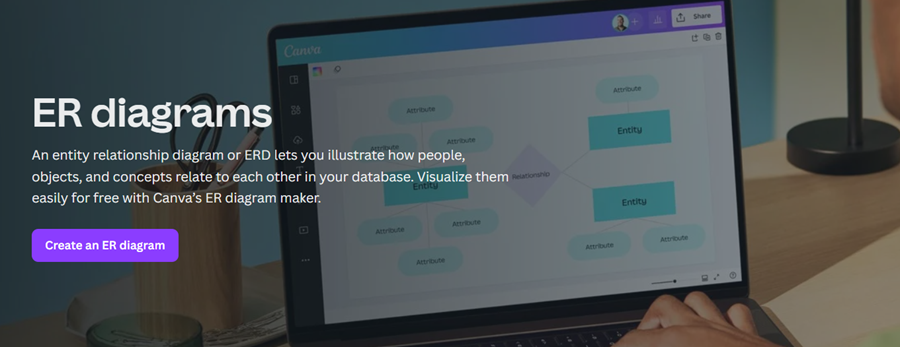
Canva Features
- Simplify ER diagram design with a drag-and-drop interface, even for non-technical users.
- Easily publish, share, or download ER diagrams and embed them into presentations, reports, or websites.
- Download high-quality versions of your ER diagram for printing or digital sharing.
Includes a wide selection of icons, shapes, and design tools for customization.
Offers a variety of templates for quick ER diagram creation.
Provides cloud storage for easy access to diagrams from anywhere.
Enable easy export of diagrams in various formats, such as PNG, PDF, and more.
Absence of automated ER diagram generation features.
Lacks advanced database modeling features found in specialized ER diagram software.
Canva Pricing
| Plan | Monthly Price | Offerings |
|---|---|---|
| Free | Free | Access to 250,000+ templates, Invite team members and collaborate in real-time |
| Pro | $15 | Ideal for small businesses: 100+ million premium stock photos, videos, audio, and graphics, 610,000+ templates, 100GB of cloud storage |
| Team | $10/user | 1 TB storage, Single-sign-on (SSO), AI Admin controls, Built-in workflows |
Visual Paradigm
Best for Comprehensive Online Modeling
Visual Paradigm is a comprehensive online platform that offers a suite of tools for diagramming, modeling, and managing software development processes. It supports various technical and business diagrams such as ERD, UML, flowcharts, and cloud architecture design.
Visual Paradigm is known for its user-friendly drag-and-drop interface. It simplifies creating complex visual models for system design and database development. It offers real-time collaboration, allowing teams to work together efficiently.
With integration into MS Office and support for Visio import, Visual Paradigm enhances productivity across different platforms. It is widely used by developers, analysts, and project managers for tasks ranging from database modeling to process mapping, making it an all-in-one solution for technical and business design needs.
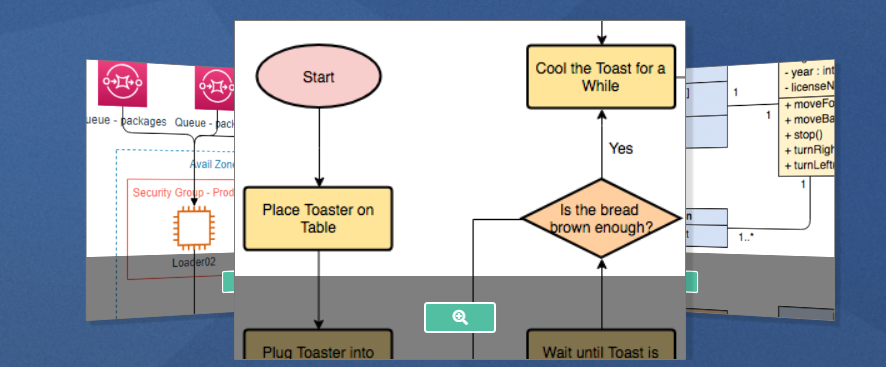
Visual Paradigm Features
- Quickly drag and drop shapes to design diagrams, with alignment guides for precise positioning.
- Export diagrams as images (PNG, JPG, GIF), PDF, or SVG files for easier sharing and communication.
- It offers extensive templates for UML, Flowchart, BPMN, ER diagrams, DFD, Mind Map, and more.
Pros
Leverage 2,000+ professional templates to accelerate diagram creation.
Access a comprehensive set of ER diagramming tools for both simple and complex database designs.
View and edit your diagrams directly within MS Office products like Word, Excel, and OneNote.
Cons
Working on complex or large diagrams may experience performance slowdowns.
User interface feels outdated compared to more modern tools
Visual Paradigm Pricing
| Plan | Monthly Price/User | Offerings |
|---|---|---|
| Free | $0 | Basic visual design editor, 5 flipbooks publishing, virtual bookshelf, 1 GB storage |
| Starter | $4 | Enhanced visual design editor, 19 chart types, 40+ process map templates, PDF editor, Hi-Res PNG export |
| Advance | $9 | 47 chart types, customizable Analysis Canvas, advanced process map features, background removal |
FigJam
Best for Interactive Design and Prototyping
Figma’s FigJam ER Diagram Tool makes it easy to create ER Diagrams for visualizing data models and entity relationships in database design. Its rich template library enables quick setup and customization, helping users save time by starting with pre-built elements.
FigJam supports real-time collaboration, allowing multiple users to work on diagrams simultaneously, making it perfect for remote or distributed teams. With FigJam, designing and managing complex data structures becomes more efficient, ensuring smoother communication and workflow across projects.
With FigJam, users can collaborate on ERDs, flowcharts, mind maps, and more, all within an intuitive drag-and-drop interface. It also includes features like sticky notes, emoji reactions, and templates, making it an excellent tool for design and non-design tasks like team workshops and brainstorming sessions.
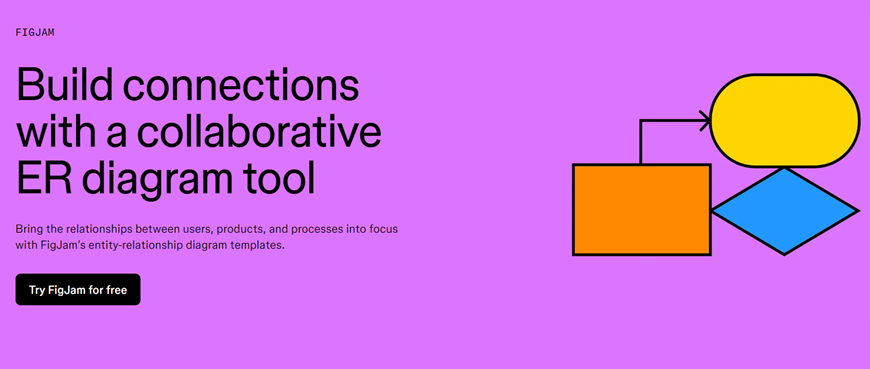
FigJam Features
- Access a wide variety of templates for different purposes, such as mind maps, user journey maps, and flowcharts.
- Users can chat with each other using the cursor chat or have audio conversations right in the FigJam file.
- Dev Mode is helpful for regular FigJam users because it lets them easily work on coding projects within the same space.
- Connects brainstorming with building prototypes, making the process faster and smoother.
Pros
Offer 1000+ customizable templates to speed up the diagram creation process.
AI assists in generating templates, summarizing discussions, and sorting ideas into themes.
Intuitive drag-and-drop interface with various shapes, sticky notes, and templates
Cons
Lacks some advanced ER diagram functionalities found in specialized ER diagram tools.
May have a learning curve for those unfamiliar with Figma’s design environment.
FigJam Pricing
| Plans | Monthy Pricing/Seat | Offerings |
|---|---|---|
| Starter Team | Free | Unlimited personal drafts, Basic file inspection, Plugins and templates, Mobile app, Music player |
| Professional | $5 | Unlimited FigJam files, Open sessions, Sharing permissions, Team libraries, Audio conversations, Voting |
| Organization | $5 | Dedicated workspaces, Advanced design systems, Guest access controls, Role setting via SCIM, Enforced password links |
EdrawMax
Best for Template Variety
EdrawMax is a comprehensive diagramming software that offers various diagram types, including ER diagrams. It’s designed to cater to various diagramming needs while providing specific tools and features for database modeling and ER diagram creation.
EdrawMax is a user-friendly diagramming tool that lets you make over 280 diagrams, such as flowcharts, mind maps, and network diagrams. Its familiar interface, inspired by MS Word, makes it easy to use. It offers a large library of templates and powerful AI features that help with diagram creation and layout optimization.
EdrawMax provides solutions for businesses, schools, and personal projects, making it a great tool for enhancing visual communication.
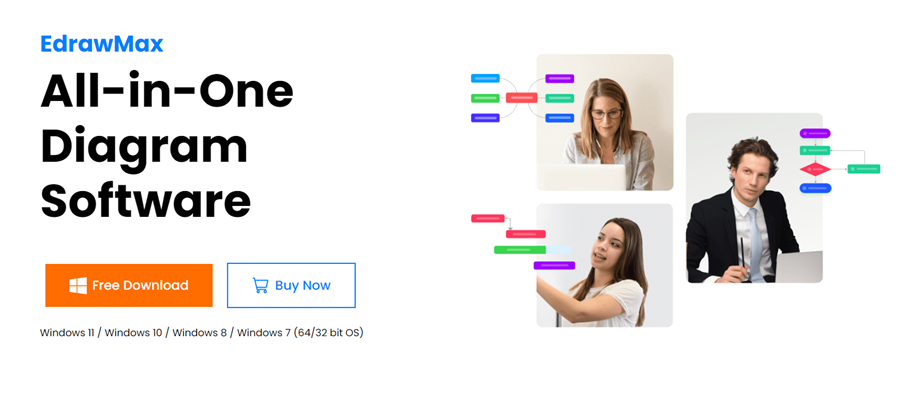
EdrawMax Features
- Offers a wide range of online sharing options, including sharing links, email, social media such as X, Pinterest, LinkedIn, etc.
- Provides a user-friendly interface with drag-and-drop functionality, making it easy to create and modify ER diagrams.
- Available on multiple operating systems (Windows, macOS, Linux) and offers both online and desktop versions.
- Users can export diagrams in multiple formats (including PDF, SVG, and various image formats) and import diagrams from other popular diagramming tools.
EdrawMax Pros
Provides more than 2000 built-in templates and over 50,000 symbols.
Edraw AI feature provides AI Chat and AI Drawing capabilities.
Integrate smoothly with cloud storage like Google Drive and Dropbox
Include comprehensive symbol libraries for ER diagrams and other charts.
EdrawMax Cons
Lack real-time collaboration features found in some competitors.
Pricing may be higher compared to some simpler, web-only diagramming tools
EdrawMax Pricing
| Plans | Pricing | Offering |
|---|---|---|
| Individuals | $45.99/year | 1GB free cloud storage, 1-year free upgrades, priority support, Al Features |
| Team & Business | $99.99 (Lifetime) | Set/Unset Gridlines, Customize Watermark, priority support, Unlimited Built-in Templates |
Miro
Best for Whiteboard-Style Collaborative Design
Miro’s ER Diagram Tool offers a collaborative and user-friendly platform for creating ER Diagrams online. It simplifies visualizing data structures and relationships, helping teams plan database architecture effectively.
Miro offers many templates and integrates with tools like Confluence and Slack to improve workflow. It offers customizable shapes, drag-and-drop functionality, and a rich library of templates to streamline the process.
With Miro’s ER diagram tool, users can easily define entities, attributes, and relationships visually. Its intuitive interface and AI-driven features enable quick diagram generation, letting teams focus on key tasks rather than design details.
Miro’s collaborative features make it easy for team members to give feedback in real-time, helping to refine database models efficiently. Overall, Miro makes the process of creating ER diagrams straightforward and enhances team communication.
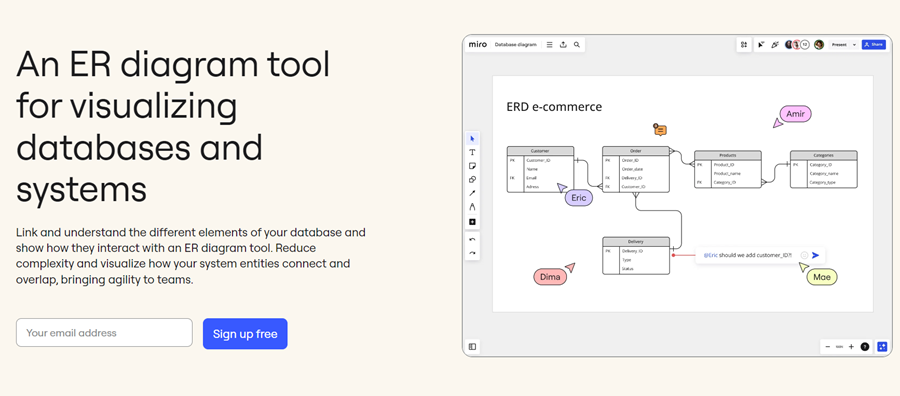
Miro Features
- AI Integration automates repetitive tasks and helps turn ideas into actionable items like diagrams and user stories.
- Allows customization of Miro to fit internal processes, along with tools to develop apps and connect with other systems.
- Real-time editing allows multiple team members to work on diagrams simultaneously and provide instant feedback.
- Multiple types of connectors and arrows are available to create relationships between entities.
Allows users to review and revert to previous versions of the diagram.
Enable commenting and feedback on diagrams to enhance team communication.
Scale diagrams easily with infinite canvas for large projects.
Hard to integrate with the Microsoft suite
Present a learning curve for users unfamiliar with Miro’s interface.
Miro’s ER diagram Pricing
| Plans | Monthly Pricing/User | Offering |
|---|---|---|
| Free | $0 | Single workspace with 3 editable boards, 5 Talktracks, 2500+ templates, 100+ integrations |
| Starter | $8 | Unlimited Talktracks, project folders, Private Mode, board version history, high-quality exports |
| Business | $16 | Secure guest access, advanced diagramming shapes, Jira integration, Miro Activities, SSO support, 50 AI credits |
Dbdiagram.io
Best for Code-Based ER Diagram Creation
Dbdiagram.io is a free, user-friendly tool for developers and data analysts to create ER diagrams using simple code. It uses DBML (Database Markup Language) to streamline the process of defining tables, fields, and relationships in database schemas.
Dbdiagram.io supports real-time collaboration, allowing teams to work together. Its customizable options, including diagram detail levels, table header colors, and grouping, help organize complex diagrams efficiently.
Dbdiagram.io enhances database design with features like version history and sticky notes, improving visualization and editing. Version history tracks changes, while sticky notes add essential context.
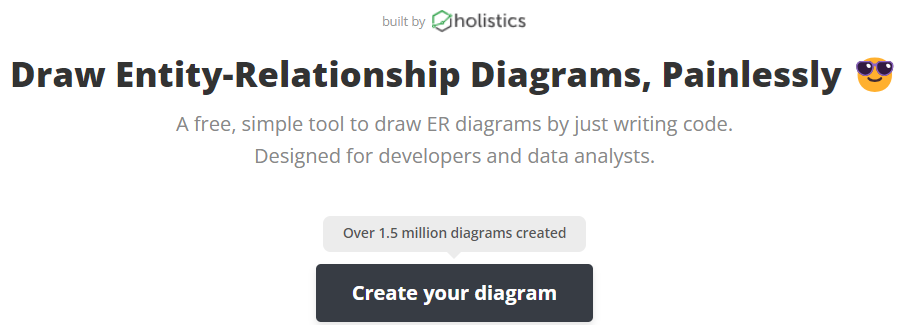
Dbdiagram.io Features
- Allow users to directly generate SQL statements from the ER diagrams, which can be used to create database tables effortlessly.
- It supports integration with SQL databases and popular web frameworks like Rails and Django, allowing users to upload files such as SQL dumps, schema.rb, or models.py to generate diagrams quickly.
- Supports exporting diagrams as images or PDFs, enabling easy sharing and documentation.
Pros
Diagrams as code can be managed with code version systems.
Allows import from MySQL, PostgreSQL, and SQL Server.
User-friendly for developers and data analysts.
Enable quick diagram generation using simple DSL (domain-specific language) syntax.
Cons
Handling very large or complex diagrams may impact performance.
Lack deep customization options for diagram styling or formats.
DBDiagram.io Pricing
| Plans | Monthly Pricing | Offering |
|---|---|---|
| Personal | Free | SQL Import & Export, Up to 10 diagrams, Public & Embedded diagrams, Export to PDF/PNG |
| Personal Pro | $8 | Unlimited diagrams & tables, Private Diagram, Header Color & Table Group, Diagram Detail Levels, Version History, Password Protection, |
| Team | $50 | Centralized Workspace, Unified Admin and Billing, 3 Free User Licenses, Sticky Notes, No Ads, Collaboration |
Best Online ER Diagram Makers Comparison
Here, we compare the best online ER diagram makers based on pricing, features, and integration options.
| ER Diagram Maker | Monthly Pricing | Features | Integration Options |
|---|---|---|---|
| Lucidchart | $9 | AI-driven visuals and templates, Real-time collaboration, Drag-and-drop ERD creation | Google Suite, Jira, Slack, Confluence |
| Creately | $5 | Real-time collaboration with version history, 70+ diagram types | MS Teams, Slack, GitHub, Confluence, Slack, Zapier |
| SmartDraw | $9.95 | Automated ER diagram generation from CSV, Real-time collaboration tools, intelligent formatting | Microsoft Office, Google Workspace, Trello |
| Canva | $10/user | User-friendly drag-and-drop interface, customizable templates, basic ERD elements | Limited direct database integration |
| Visual Paradigm | $4/user | Access to 2,000+ templates, Comprehensive modeling, advanced ERD tools, data modeling | MS Office and Visio import, Visual Studio, IntelliJ IDEA, Eclipse |
| FigJam | $5/user | Real-time collaboration, Interactive design, prototyping, ERD creation | Figma, Slack, Jira, Google Drive |
| Edraw Max | $45.99/year | Over 2000 built-in templates, AI features for diagram creation, advanced diagramming features | Google Workspace, Microsoft Office, Dropbox |
| Miro | $8/user | AI integration for automation, Whiteboard-style collaboration, Customizable templates | Microsoft Teams, Slack, Google Drive, Asana |
| DBDiagram | $8 | Code-based ER diagram creation, SQL import/export capabilities, Real-time collaboration, Supports DBML | Notion, GitHub, Google Sheets |
Features of ER Diagram Tools
ER diagram tools typically offer a variety of features to enhance the design and development of database models. Key features include:
- User-Friendly Interface: Most tools provide a drag-and-drop interface that simplifies the creation of ER diagrams.
- Built-in Libraries: Access to pre-defined shapes and templates helps speed up diagramming.
- Collaboration Capabilities: Many tools allow multiple users to work on diagrams simultaneously, facilitating team collaboration.
- Database Compatibility: Tools often support integration with various databases, enabling easy data import/export and direct mapping of database schemas.
- Diagramming Capabilities: Advanced diagramming options, such as automated diagram generation from CSV files and creating different types of diagrams (UML, DFD), are also available.
- Import and Export Options: Most tools support various file formats for importing and exporting diagrams, including PDF, PNG, and SVG.
What is an ER Diagram?
An Entity-Relationship (ER) Diagram is a visual representation of the relationships between entities in a database. It serves as a blueprint for database design, helping to illustrate how data is structured and interconnected.
- Entities: These are objects or things within the domain that have a distinct existence, such as customers, products, or orders.
- Attributes: Attributes are the properties or details that describe an entity. For example, a customer entity may have attributes like name, email, and phone number.
- Relationships: Relationships illustrate how entities are connected. They can represent associations such as one-to-one, one-to-many, or many-to-many connections between entities.
How to Choose the Best ERD Tools
When selecting the best ERD tools for your needs, consider the following factors:
- Built-in Libraries: Look for tools that offer comprehensive libraries of shapes and symbols relevant to your industry to streamline diagram creation.
- Ease of Use: Choose a tool with an intuitive interface that allows users to create diagrams quickly without extensive training.
- Database Integration: Ensure the tool can integrate with your existing database systems, allowing for easy import/export of data and direct mapping.
- Real-Time Collaboration: Opt for tools that support real-time collaboration, enabling teams to work together effectively, regardless of location.
- Customization Options: Offers flexibility in styling, formatting, and layouts for tailored diagrams.
- File Format Support: Export and import in multiple formats, including PDF, PNG, and SVG.
- Pricing: Consider your budget and explore the pricing models available, including free versions, subscription plans, or one-time purchases, to find a solution that fits your financial requirements.
Best Practices for Effective ERD Diagram Creation
To create effective ER diagrams, follow these best practices:
- Understand the Basics First: Familiarize yourself with fundamental concepts of ER modeling, including entities, attributes, and relationships. Using database modeling tools can help streamline this process.
- Gather Complete Requirements: Before starting the diagram, ensure you have all the requirements from the team. Good database documentation tools make it easier to keep your diagrams understandable for everyone involved.
- Use Descriptive Names: Select clear and meaningful names for your entities and attributes. This will help everyone understand what each part of the diagram represents.
- Standardize Symbols and Notations: Use the same symbols and notations throughout your diagram. Consistency helps viewers quickly recognize and understand the information being presented.
- Identify Key Attributes: Focus on the most important attributes for each entity. Highlighting these helps convey relevant details without overwhelming the viewer with too much information.
- Establish Relationships Clearly: Clearly show how entities are related to each other, using lines to connect them and indicating the type of relationship (like one-to-one or one-to-many). This clarity helps everyone see how data interacts.
- Minimize Redundancy: Avoid repeating information within your diagram. Redundancy can lead to confusion and make the diagram harder to read, so focus on being concise.
- Keep Diagrams Readable: Aim for simplicity in your design. A clean, uncluttered diagram is easier to understand, so try not to include too much detail in one view.
- Use Attributes Wisely: Limit the number of attributes for each entity to those that are most relevant. This prevents confusion and keeps the diagram straightforward.
- Validate with Stakeholders: Regularly share your diagram with stakeholders for feedback. This ensures that the diagram meets their needs and addresses any concerns early in the process.
- Consider Future Expansion: When designing your ER diagram, consider how the system might grow in the future. This foresight can help you create a more flexible and scalable design.
- Document Assumptions and Decisions: Write down any assumptions or decisions you make during the diagram creation process. This documentation can help clarify your reasoning later on.
- Regularly Update the ER Diagram: As changes occur in the system or requirements, ensure the ER diagram is updated accordingly.
Frequently Asked Questions
ERD (Entity-Relationship Diagram) software is a tool that helps users create visual representations of the relationships between data entities in a database. It simplifies database design and helps in understanding data structures.
ERDs are widely used in database design to illustrate how entities relate to one another, making it easier for developers and stakeholders to visualize the data structure and its requirements. They are essential in planning and optimizing databases.
An ER diagram in SQL represents the database schema visually. It shows the entities (tables), their attributes (columns), and the relationships (foreign keys) between them, helping in understanding how data is organized within a relational database.
The two main types of ERD are Conceptual ERD, which provides a high-level overview of the data structure, and Logical ERD, which delves into more detailed relationships and attributes, focusing on how data is organized without considering physical implementation.
To create an ERD in a Database Management System (DBMS), follow these steps:
– Identify the entities that represent the data.
– Define the attributes for each entity.
– Establish relationships between entities, including cardinality.
– Use ERD software to visually map out these elements, ensuring clarity and consistency.

